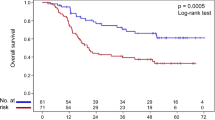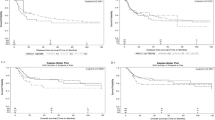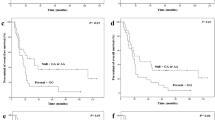Abstract
The aim of this study was to investigate the role of common polymorphisms in the nucleotide excision repair pathway genes in the tumorigenesis of osteosarcoma and in the response to DNA damaging therapies, such as cisplatin-based neoadjuvant therapy. Excision repair cross-complementing (ERCC) group 2 (XPD; rs13181 and rs1799793), group 5 (XPG; rs17655) and group 1 (XPA; rs3212986 and rs11615) polymorphisms were analyzed in a group of 130 homogenously treated patients with high-grade osteosarcoma, for association with event-free survival (EFS), using the Kaplan–Meier plots and log-rank test. A positive association was observed between both XPD single-nucleotide polymorphisms and an increased EFS (hazards ratio (HR)=0.34, 95% confidence interval (CI) 0.12–0.98 and HR=0.19, 95% CI 0.05–0.77, respectively). We had also performed a case–control study for relative risk to develop osteosarcoma. Patients carrying at least one variant allele of XPD rs1799793 had a reduced risk of developing osteosarcoma, compared with wild-type patients (odds ratio=0.55, 95% CI 0.36–0.84). This study suggests that XPD rs1799793 could be a marker of osteosarcoma associated with features conferring either a better prognosis or a better outcome after platinum therapy, or both.
This is a preview of subscription content, access via your institution
Access options
Subscribe to this journal
Receive 6 print issues and online access
$259.00 per year
only $43.17 per issue
Buy this article
- Purchase on Springer Link
- Instant access to full article PDF
Prices may be subject to local taxes which are calculated during checkout



Similar content being viewed by others
References
Hattinger CM, Pasello M, Ferrari S, Picci P, Serra M . Emerging drugs for high-grade osteosarcoma. Expert Opin Emerg Drugs 2010; 15: 615–634.
Bruland OS, Hoifodt H, Saeter G, Smeland S, Fodstad O . Hematogenous micrometastases in osteosarcoma patients. Clin Cancer Res 2005; 11: 4666–4673.
Wesolowski R, Budd GT . Use of chemotherapy for patients with bone and soft-tissue sarcomas. Cleve Clin J Med 2010; 77 (Suppl 1): S23–S26.
Bacci G, Longhi A, Fagioli F, Briccoli A, Versari M, Picci P . Adjuvant and neoadjuvant chemotherapy for osteosarcoma of the extremities: 27 year experience at Rizzoli Institute, Italy. Eur J Cancer 2005; 41: 2836–2845.
Marina N, Gebhardt M, Teot L, Gorlick R . Biology and therapeutic advances for pediatric osteosarcoma. Oncologist 2004; 9: 422–441.
Bacci G, Longhi A, Versari M, Mercuri M, Briccoli A, Picci P . Prognostic factors for osteosarcoma of the extremity treated with neoadjuvant chemotherapy: 15-year experience in 789 patients treated at a single institution. Cancer 2006; 106: 1154–1161.
Clark JC, Dass CR, Choong PF . A review of clinical and molecular prognostic factors in osteosarcoma. J Cancer Res Clin Oncol 2008; 134: 281–297.
Serra M, Scotlandi K, Reverter-Branchat G, Ferrari S, Manara MC, Benini S et al. Value of P-glycoprotein and clinicopathologic factors as the basis for new treatment strategies in high-grade osteosarcoma of the extremities. J Clin Oncol 2003; 21: 536–542.
Bajpai J, Sharma M, Sreenivas V, Kumar R, Gamnagatti S, Khan SA et al. VEGF expression as a prognostic marker in osteosarcoma. Pediatr Blood Cancer 2009; 53: 1035–1039.
Le MV, Longy M, Bonaiti-Pellie C, Bui B, Houede N, Coindre JM et al. Genetic polymorphisms of the XPG and XPD nucleotide excision repair genes in sarcoma patients. Int J Cancer 2006; 119: 1732–1735.
Kong C, Hansen MF . Biomarkers in osteosarcoma. Expert Opin Med Diagn 2009; 3: 13–23.
Smida J, Baumhoer D, Rosemann M, Walch A, Bielack S, Poremba C et al. Genomic alterations and allelic imbalances are strong prognostic predictors in osteosarcoma. Clin Cancer Res 2010; 16: 4256–4267.
Goode EL, Ulrich CM, Potter JD . Polymorphisms in DNA repair genes and associations with cancer risk. Cancer Epidemiol Biomarkers Prev 2002; 11: 1513–1530.
Martin LP, Hamilton TC, Schilder RJ . Platinum resistance: the role of DNA repair pathways. Clin Cancer Res 2008; 14: 1291–1295.
Reed E . Platinum-DNA adduct, nucleotide excision repair and platinum based anti-cancer chemotherapy. Cancer Treat Rev 1998; 24: 331–344.
Stoehlmacher J, Park DJ, Zhang W, Yang D, Groshen S, Zahedy S et al. A multivariate analysis of genomic polymorphisms: prediction of clinical outcome to 5-FU/oxaliplatin combination chemotherapy in refractory colorectal cancer. Br J Cancer 2004; 91: 344–354.
Benhamou S, Sarasin A . ERCC2/XPD gene polymorphisms and lung cancer: a HuGE review. Am J Epidemiol 2005; 161: 1–14.
Duell EJ, Wiencke JK, Cheng TJ, Varkonyi A, Zuo ZF, Ashok TD et al. Polymorphisms in the DNA repair genes XRCC1 and ERCC2 and biomarkers of DNA damage in human blood mononuclear cells. Carcinogenesis 2000; 21: 965–971.
Lunn RM, Helzlsouer KJ, Parshad R, Umbach DM, Harris EL, Sanford KK et al. XPD polymorphisms: effects on DNA repair proficiency. Carcinogenesis 2000; 21: 551–555.
Spitz MR, Wu X, Wang Y, Wang LE, Shete S, Amos CI et al. Modulation of nucleotide excision repair capacity by XPD polymorphisms in lung cancer patients. Cancer Res 2001; 61: 1354–1357.
Caronia D, Patino-Garcia A, Milne RL, Zalacain-Diez M, Pita G, Alonso MR et al. Common variations in ERCC2 are associated with response to cisplatin chemotherapy and clinical outcome in osteosarcoma patients. Pharmacogenomics J 2009; 9: 347–353.
De las Penas R, Sanchez-Ronco M, Alberola V, Taron M, Camps C, Garcia-Carbonero R et al. Polymorphisms in DNA repair genes modulate survival in cisplatin/gemcitabine-treated non-small-cell lung cancer patients. Ann Oncol 2006; 17: 668–675.
Gurubhagavatula S, Liu G, Park S, Zhou W, Su L, Wain JC et al. XPD and XRCC1 genetic polymorphisms are prognostic factors in advanced non-small-cell lung cancer patients treated with platinum chemotherapy. J Clin Oncol 2004; 22: 2594–2601.
Kim HS, Kim MK, Chung HH, Kim JW, Park NH, Song YS et al. Genetic polymorphisms affecting clinical outcomes in epithelial ovarian cancer patients treated with taxanes and platinum compounds: a Korean population-based study. Gynecol Oncol 2009; 113: 264–269.
Krivak TC, Darcy KM, Tian C, Armstrong D, Baysal BE, Gallion H et al. Relationship between ERCC1 polymorphisms, disease progression, and survival in the Gynecologic Oncology Group Phase III Trial of intraperitoneal versus intravenous cisplatin and paclitaxel for stage III epithelial ovarian cancer. J Clin Oncol 2008; 26: 3598–3606.
Quintela-Fandino M, Hitt R, Medina PP, Gamarra S, Manso L, Cortes-Funes H et al. DNA-repair gene polymorphisms predict favorable clinical outcome among patients with advanced squamous cell carcinoma of the head and neck treated with cisplatin-based induction chemotherapy. J Clin Oncol 2006; 24: 4333–4339.
Rosell R, Taron M, Barnadas A, Scagliotti G, Sarries C, Roig B . Nucleotide excision repair pathways involved in cisplatin resistance in non-small-cell lung cancer. Cancer Control 2003; 10: 297–305.
Sakano S, Wada T, Matsumoto H, Sugiyama S, Inoue R, Eguchi S et al. Single nucleotide polymorphisms in DNA repair genes might be prognostic factors in muscle-invasive bladder cancer patients treated with chemoradiotherapy. Br J Cancer 2006; 95: 561–570.
Saldivar JS, Wu X, Follen M, Gershenson D . Nucleotide excision repair pathway review I: implications in ovarian cancer and platinum sensitivity. Gynecol Oncol 2007; 107 (Suppl 1): S56–S71.
Bradbury PA, Kulke MH, Rebecca SH, Zhou W, Ma C, Xu W et al. Cisplatin pharmacogenetics, DNA repair polymorphisms, and esophageal cancer outcomes. Pharmacogenet Genomics 2009; 19: 613–625.
Hou SM, Falt S, Angelini S, Yang K, Nyberg F, Lambert B et al. The XPD variant alleles are associated with increased aromatic DNA adduct level and lung cancer risk. Carcinogenesis 2002; 23: 599–603.
Kiyohara C, Yoshimasu K . Genetic polymorphisms in the nucleotide excision repair pathway and lung cancer risk: a meta-analysis. Int J Med Sci 2007; 4: 59–71.
Matullo G, Dunning AM, Guarrera S, Baynes C, Polidoro S, Garte S et al. DNA repair polymorphisms and cancer risk in non-smokers in a cohort study. Carcinogenesis 2006; 27: 997–1007.
Terry MB, Gammon MD, Zhang FF, Eng SM, Sagiv SK, Paykin AB et al. Polymorphism in the DNA repair gene XPD, polycyclic aromatic hydrocarbon-DNA adducts, cigarette smoking, and breast cancer risk. Cancer Epidemiol Biomarkers Prev 2004; 13: 2053–2058.
Vogel U, Hedayati M, Dybdahl M, Grossman L, Nexo BA . Polymorphisms of the DNA repair gene XPD: correlations with risk of basal cell carcinoma revisited. Carcinogenesis 2001; 22: 899–904.
Vogel U, Laros I, Jacobsen NR, Thomsen BL, Bak H, Olsen A et al. Two regions in chromosome 19q13.2-3 are associated with risk of lung cancer. Mutat Res 2004; 546: 65–74.
Wen H, Ding Q, Fang ZJ, Xia GW, Fang J . Population study of genetic polymorphisms and superficial bladder cancer risk in Han-Chinese smokers in Shanghai. Int Urol Nephrol 2009; 41: 855–864.
Yu HP, Wang XL, Sun X, Su YH, Wang YJ, Lu B et al. Polymorphisms in the DNA repair gene XPD and susceptibility to esophageal squamous cell carcinoma. Cancer Genet Cytogenet 2004; 154: 10–15.
Zhou W, Liu G, Park S, Wang Z, Wain JC, Lynch TJ et al. Gene-smoking interaction associations for the ERCC1 polymorphisms in the risk of lung cancer. Cancer Epidemiol Biomarkers Prev 2005; 14: 491–496.
Doecke J, Zhao ZZ, Pandeya N, Sadeghi S, Stark M, Green AC et al. Polymorphisms in MGMT and DNA repair genes and the risk of esophageal adenocarcinoma. Int J Cancer 2008; 123: 174–180.
Zienolddiny S, Campa D, Lind H, Ryberg D, Skaug V, Stangeland L et al. Polymorphisms of DNA repair genes and risk of non-small cell lung cancer. Carcinogenesis 2006; 27: 560–567.
Kaplan EL, Meier P . Non-parametric estimation from incomplete observations. J Am Stat Assoc 1958; 53: 457–481.
Cox DR . Regression models and life tables. J Roy Stat Soc B 1972; 34: 187–220.
Armitage P, Berry G, Matthews JNS . Statistical Methods in Medical Res, 4th edn. Blackwell Science: Oxford, 2002.
Ottaviani G, Jaffe N . The epidemiology of osteosarcoma. Cancer Treat Res 2009; 152: 3–13.
Nakayama R, Sato Y, Masutani M, Ogino H, Nakatani F, Chuman H et al. Association of a missense single nucleotide polymorphism, Cys1367Arg of the WRN gene, with the risk of bone and soft tissue sarcomas in Japan. Cancer Sci 2008; 99: 333–339.
He X, Ye F, Zhang J, Cheng Q, Shen J, Chen H . Susceptibility of XRCC3, XPD, and XPG genetic variants to cervical carcinoma. Pathobiology 2008; 75: 356–363.
Jiang Z, Li C, Xu Y, Cai S, Wang X . Associations between XPD polymorphisms and risk of breast cancer: a meta-analysis. Breast Cancer Res Treat 2010; 123: 203–212.
Wang F, Chang D, Hu FL, Sui H, Han B, Li DD et al. DNA repair gene XPD polymorphisms and cancer risk: a meta-analysis based on 56 case-control studies. Cancer Epidemiol Biomarkers Prev 2008; 17: 507–517.
Zhang J, Qiu LX, Leaw SJ, Hu XC, Chang JH . The association between XPD Asp312Asn polymorphism and lung cancer risk: a meta-analysis including 16,949 subjects. Med Oncol; published online 30 November 2010; doi:10.1007/s12032-010-9501-8 [e-pub ahead of print].
Zhang CZ, Chen ZP, Xu CQ, Ning T, Li DP, Hou RP . Correlation of XPD gene with susceptibility to gastric cancer. Ai Zheng 2009; 28: 1163–1167.
Rybicki BA, Conti DV, Moreira A, Cicek M, Casey G, Witte JS . DNA repair gene XRCC1 and XPD polymorphisms and risk of prostate cancer. Cancer Epidemiol Biomarkers Prev 2004; 13: 23–29.
Stadler ZK, Gallagher DJ, Thom P, Offit K . Genome-wide association studies of cancer: principles and potential utility. Oncology 2010; 24: 629–637.
Stadler ZK, Thom P, Robson ME, Weitzel JN, Kauff ND, Hurley KE et al. Genome-wide association studies of cancer. J Clin Oncol 2010; 28: 4255–4267.
Wu MC, Kraft P, Epstein MP, Taylor DM, Chanock SJ, Hunter DJ et al. Powerful SNP-set analysis for case-control genome-wide association studies. Am J Hum Genet 2010; 86: 929–942.
Acknowledgements
This study was supported by grants from Associazione Italiana per la Ricerca sul Cancro (AIRC) grants to M Serra; EuroBoNeT, a European Commission-granted Network of Excellence for studying the pathology and genetics of bone tumors (LSHC-CT-2006-018814); Italian Ministry of Health ‘Progetto Oncologia.’
Author information
Authors and Affiliations
Corresponding author
Ethics declarations
Competing interests
The authors declare no conflict of interest.
Additional information
Supplementary Information accompanies the paper on the The Pharmacogenomics Journal website
Supplementary information
Rights and permissions
About this article
Cite this article
Biason, P., Hattinger, C., Innocenti, F. et al. Nucleotide excision repair gene variants and association with survival in osteosarcoma patients treated with neoadjuvant chemotherapy. Pharmacogenomics J 12, 476–483 (2012). https://doi.org/10.1038/tpj.2011.33
Received:
Revised:
Accepted:
Published:
Issue Date:
DOI: https://doi.org/10.1038/tpj.2011.33
Keywords
This article is cited by
-
The effect of ERCC1 and ERCC2 gene polymorphysims on response to cisplatin based therapy in osteosarcoma patients
BMC Medical Genetics (2018)
-
Genetic polymorphisms in ERCC1 and ERCC2 genes are associated with response to chemotherapy in osteosarcoma patients among Chinese population: a meta-analysis
World Journal of Surgical Oncology (2017)
-
The pharmacogenomics of osteosarcoma
The Pharmacogenomics Journal (2017)
-
rs1760944 Polymorphism in the APE1 Region is Associated with Risk and Prognosis of Osteosarcoma in the Chinese Han Population
Scientific Reports (2017)
-
Haplotype analysis on relationship of ERCC2 and ERCC3 gene polymorphisms with osteosarcoma risk in Chinese young population
Mammalian Genome (2017)



